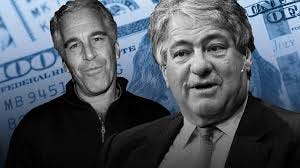Senate Committee Asks Leon Black to Explain His Art Dealings with Jeffrey Epstein
The hits keep coming for Leon Black, who has now been hit by a senate committee concerning his business dealings with his art collection and Epstein. Black, recently shelled out over $62.5 million in the Virgin Islands regarding his dealings with Epstein and JPMorgan Chase. Black is also accused of raping a 16-year-old girl with Down syndrome and autism in 2002 at the Manhattan townhouse of convicted sex offender Jeffrey Epstein.
The financial ties between embattled businessmen and collector Leon Black and convicted sex trafficker Jeffrey Epstein are under review by the US Senate Finance Committee, a letter from its chairman, Senator Ron Wyden, reveals.
The 16-page letter, dated to July 23, accuses Black, former Museum of Modern Art chairman, of withholding information regarding his dealings with Epstein.
“As you are aware, the Committee is investigating the $158 million in payments you made to Epstein for services related to a variety of tax and estate planning matters. In particular, the Committee seeks information on Epstein’s participation in structuring trusts and other complex transactions designed to avoid federal gift and estate taxes on as much as $2 billion in wealth transferred to your children,” the letter reads. The committee also requested more information involving Epstein’s “extraordinary compensation scheme, which involved amounts that far exceeded those paid to other professional advisors” employed by Black.
A spokesperson for Black told Artnet News in an emailed statement: “Mr. Black has cooperated extensively with the Committee, providing detailed information about the matters under review. The transactions referenced in the Committee’s letter were lawful in all respects, were conceived of, vetted and implemented by reputable law firms and tax and other advisors, and Mr. Black has fully paid all taxes owed to the government.”
At the center of the investigation is Black’s art holdings, the management of which, Wyden writes, received “substantial advice” from Epstein. Toward the end of the letter, Wyden notes that in a briefing to the committee on August 1, 2022, Black’s outside counsel “indicated that Epstein provided substantial advice related to your private art collection, which is worth over $1 billion.”
“This advice reportedly included helping you form a new art partnership as well as assistance in connection with the sale of certain pieces of artwork,” reads the letter. Wyden also requests more information on the “purpose” of the new art partnership, as well as “any art loans that involved Epstein, including Epstein’s role related to those loans.”
Finally, he asked for a list of “any like-kind exchange transactions” involving artworks valued at over $1 million. A “like-kind” exchange—or a “1031,” a term named after a tax provision in the Internal Revenue Code—allows investors to defer capital gain taxes by using the proceeds from the sale of like-valued assets held for investment purposes.
The provision was popular with art flippers looking to dodge the high capital gains rate (28 percent) that blue-chip artworks occur. Congress killed 1031 exchanges as they apply to art in 2018. Wyden asked for a detailed breakdown of each like-kind exchange transaction between Black and Epstein.
Wyden’s letter was sent shortly after the embattled collector finalized a deal with the US Virgin Islands— where Epstein conducted most of his sordid business—to avoid a potential lawsuit over his dealings with Epstein

